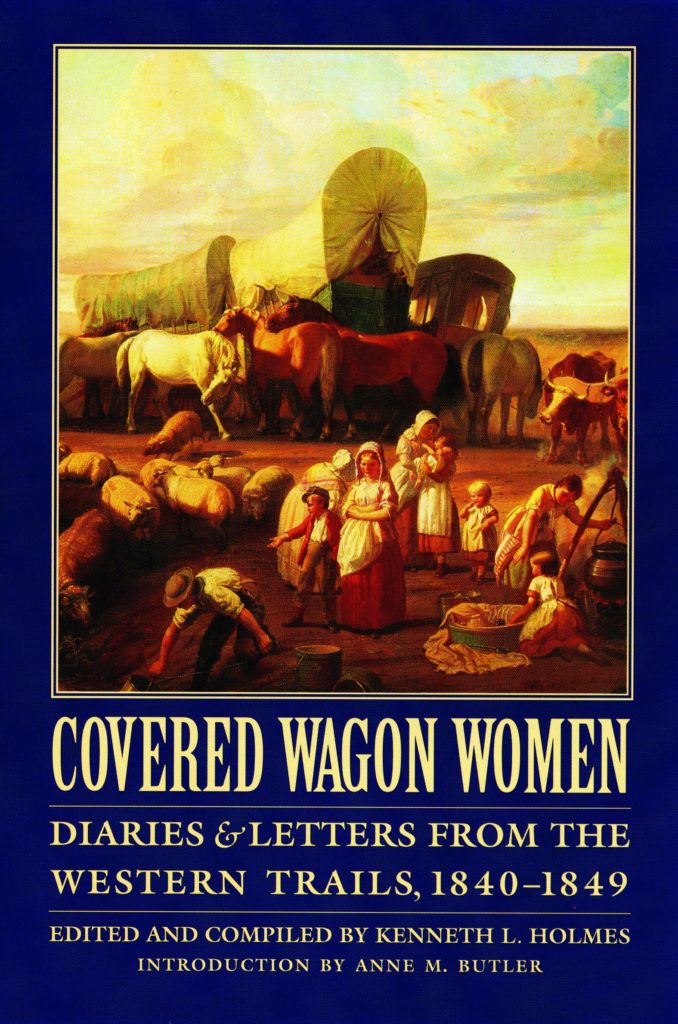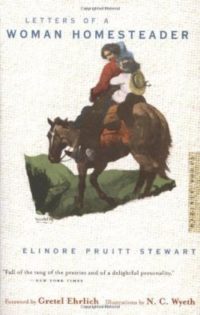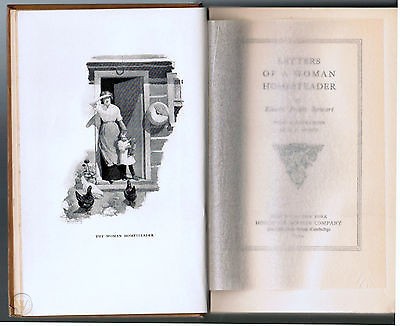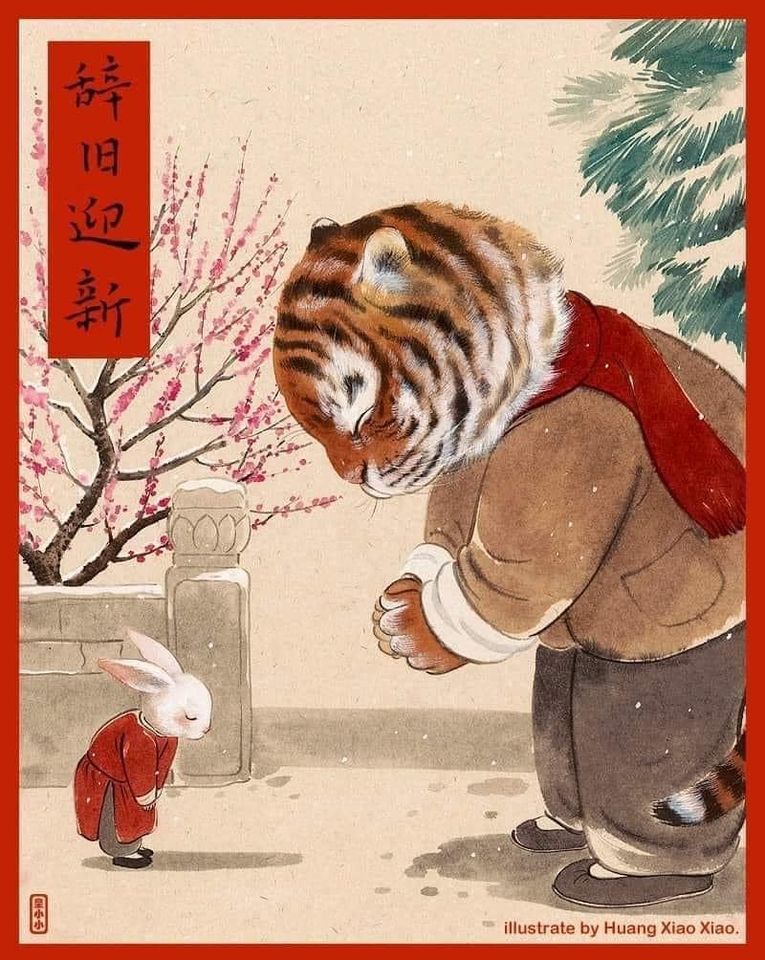A Kick in Attitude
This past weekend, I pulled my back wrong and then my knee started acting up and I was hobbling around like I was ancient (which I’m not – yet). Then, given the horrific shootings, Chinese New Year was a somber affair among our neighbor friends. No parties or sharing of cheerful foodstuffs.
In short, I was feeling sorry for myself, a state of mind which I abhor.
Whenever I catch myself having a pity party — I pull out either of these two books and open to any page to remind myself what a plum and cushy life I lead.
Covered Wagon Women
Edited and Compiled by Kenneth L. Holmes
Covered Wagon Women was recommended by friend (looking at you, with love, GH) many years ago and it still has a treasured place on my shelves — just for times like this when I need to kick my ass attitude out of an inappropriate bad mood.
These are the collected diaries and letters of fourteen pioneer women traveling west in covered wagons during the 1840’s.
Mr. Holmes, a historian has left everything in its original source — unedited diary entries, letters and other correspondence. This is how the women actually wrote then, complete with original dialect, spelling, and punctuation — complete with mistakes. The women speak in their own voices, without any modern influence. It will take you a few pages (or chapters) to get into the rhythm of their voices — and figure out the spelling — but after a bit, you get the hang of it. Whenever I re-open this book and read an entry or two, I always feel like I am actually there in the wagon listening to their personal accounts.
Every entry gives a slightly different viewpoint on the hardship and horror these remarkable women experienced and endured to discover new lives out west. Some are mundane, others soul-crushing, and some spirit-lifting. We read of Tamsen Donner and young Virginia Reed, members of the ill-fated Donner party; Patty Sessions, the Mormon midwife who delivered five babies on the trail between Omaha and Salt Lake City; Rachel Fisher, who buried both her husband and her little girl before reaching Oregon.
Because this collection is told from a woman’s point of view, domesticity is shown to be a means of survival, much as a gun. They cooked meals every day under dire circumstances. They sewed, weaved, knitted and mended clothes and bedding. They washed up when they had enough water, but went dirty for weeks if required. They walked miles over some of the roughest terrain America possesses – rocks, sand, dust, mud – over flat rutted trails and up and down mountain paths. They fed and milked cows, helped keep oxen and horses alive, birthed babies and buried them.
There is much unsaid in these letters. They rarely speak of their personal suffering, but instead relate what happened simply and factually. Despite the brevity, when a letter mentions how long they went without water and how many animals and people died because of it, it is easy to read between the lines.
There are 11 books in this series, and maybe someday I will tackle more, but for now this first in the series is enough to remind me of the luxuries in my life – water at the turn of a faucet, a warm bed, soap – well, you know what I mean.
Get yourself out of your bad mood and check out Covered Wagon Women – available at your local library.
Letters of a Woman Homesteader
by Elinore Pruitt Stewart
In the same vein, but not nearly as grim, is Letters of a Woman Homesteader, which I have read cover to cover.
As a young widow Elinore Pruitt left Denver in 1909, with her young daughter, and set out for Wyoming, where she hoped to buy a ranch. Determined to prove that a lone woman could survive the hardships of homesteading, she initially worked as a housekeeper for a neighbor — a kind but taciturn Scottish bachelor, whom she eventually married.
In twenty-six letters written to a friend back in Denver, she joyfully records her days, not considering the life she has chosen on the frontier as hardship. Instead, she revels in the natural beauty of her surroundings and in her friendships with like-minded women in her frontier community.
Elinore and her friends, face the unexpected with courage and good humor. They live unselfishly, and are overly generous with kindness and deeds for those less fortunate. She tells of unified and skillful hospitality; impromptu weddings, spur of the moment feasts for strangers, and designing and sewing wardrobes for a needy family in just a few days time.
Spring and summers were hard, she concedes, and were taken up with branding, farming, doctoring cattle, and other chores. But with the arrival of fall, Pruitt found time to take her young daughter on camping trips and serve her neighbors as midwife, doctor, teacher, Santa Claus, and friend.
My well-worn copy contains the original illustrations by N. C. Wyeth. However, I found out the digital version of Letters of A Woman Homesteader is free — as this classic is in the public domain.
Described by the Wall Street Journal as “warmly delightful, vigorously affirmative,” this classic of American frontier life will charm today’s audience as much as it fascinated readers when it was first published in 1914.
The reading is indeed enjoyable and flows beautifully — it reads like a novel.
So there you go. In a bad mood? Need a good kick in the attitude? Instead of self help books or those cheesy gratitude journals, read about women who met extreme hardship and tough lives with bravery, strength, humor, kindness, and grace.
Now I have to go unload my wonderfully modern and convenient dishwasher – no tin pans rinsed in the creek for me.
I’m a very lucky gal – pity party is over.
With respect to the new Lunar New Year.











Comment *I am everyday grateful for our washer, dryer, hot water heater, Whole Foods 3 blocks away, Prop 13 . . . and, oh, the fact that I don’t have to work any more. Lucky? Goddamn right!